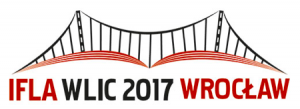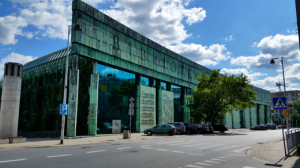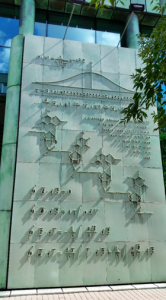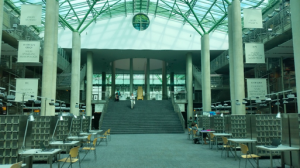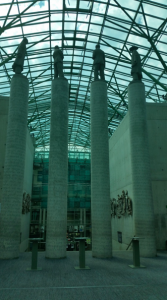The fact that we are sending this out in the fourth week of January reflects how busy 2018 is already shaping up to be. But it is important to take stock and reflect on the achievements of the past year.
In many ways 2017 was a year of numbers for the Office of Scholarly Communication. Some of them were large – we celebrated 1000 datasets deposited to the repository and 1 million downloads of items in the repository in 2017. Other numbers were enormous, like the overwhelming tide of people who tried to access Professor Stephen Hawking’s PhD thesis when we released it, and the very impressive Almetrics score of over 1500 for his thesis because the release “broke the internet”. There were some small but significant numbers too, including farewelling a few integral members of staff.
Celebrations
The OSC held a celebration in September to mark 1000 datasets in the repository. It was supposed to be a ‘garden party’ but inclement weather put paid to that! Apollo now contains the largest body of datasets of any UK HEI and downloads from the site account for a 36% (27,346) of all dataset downloads from 132 UK HEI repositories in 2017, according to IRUS-UK.
Our Repository Integration Manager, Dr Agustina Martinez was a joint winner of a 2017 Professional Services Recognition Award. The judges used their discretionary powers to make this award that did not fit into the given categories. The award was for a “particularly successful cross-departmental team partnership” between the OSC, the Research Office, and the University Information Service for “preparing, implementing and evaluating the synchronisation of two internal research systems, a complex and challenging project that succeeded because of effective collaborative working”.
This is a prestigious achievement and we are very proud of her.
Open access activity
The Open Access Team within the OSC processes a huge number of articles, datasets and theses into the Apollo repository to ensure the University is compliant with various funder requirements. Over the past few years this work has been a primarily manual process, causing significant backlogs for the team.
A huge 18 month project has been the linking of our DSpace repository to the University’s CHRIS system, Symplectic Elements. In June 2017, the OSC successfully launched a new deposit system for article manuscripts for the research community, with new workflows eliminating the manual uploading of information to the repository.
The Request a Copy function was very popular, with 3108 requests in 2017 alone. The vast majority of these were for articles (1599) and theses (1282). Currently these requests are manually processed and forwarded to the authors manually, a very time consuming process.
Theses fun and games
During 2017 the team developed a new deposit form for theses which has allowed current and past students to easily upload their theses. The University introduced a new policy for PhD students to provide digital versions of their theses and the number of theses in the repository is now increasing exponentially.
In Open Access Week we opened up access to Professor Stephen Hawking’s thesis Properties of expanding universes. The response was incredible, with over 22,000 access an hour at one stage and the story that this thesis had ‘broken the internet’ hit the world news. Over a million unique IP addresses hit the page during and over the weeks after Open Access Week. There were over 42,000 accesses of Professor Hawking’s thesis in December alone.
Possibly off the back of that huge publicity, our (relatively) quiet call to alumni to also share their PhDs openly online has been met with enthusiasm and we continue to receive regular queries from our alumni community.
Experiments/research
We are now half way through our Open Research Pilot Project which has identified primary issues in this area as a lack of sustainable support for infrastructure and a lack of reward and incentive to work openly. The participants agree that having the dialogue is helping the participating researchers exchange ideas and the Wellcome Trust develop new services and policies.
We started investigating Text and Data Mining in 2017, with a meeting of interested library staff in February. This was followed up with a workshop at the RLUK conference which identified the fact that we do not have any Service Level Agreements with our publishers. Within Cambridge, our colleague James Cauldwell prepared a TDM libguide for our research community. In July we hosted an extremely well attended Text and Data Mining symposium which showcased many experiments and methods. The presentation slide decks and some of the recordings of the presentations are available on our website.
The Data Champions programme has been the subject of considerable interest worldwide and the website has been updated to be more useful to visitors. Regular meetings and training fora were held in 2017.
Training of the library community
Part of the work of the OSC is to develop the skills and knowledge of the large Cambridge library community in scholarly communication issues. Our Research Skills Support Coordinator Claire Sewell had an impressive 403 attendees at 23 events with a 70% rating of ‘excellent’. Claire launched successful online webinars in 2017 in addition to her face to face programme delivery. An example is ‘How to spot a predatory publisher’.
Claire has also been involved with Danny Kingsley on a sector wide project that is looking at the broader issue of training provision in scholarly communication. This project arose from a workshop held at UKSG in April. In 2017 the group, which includes representatives from Jisc, SCONUL, ARMA, RLUK, UKCORR, Vitae and CILIP, had its first meeting in June and will continue work this year.
Outreach to the research community
In 2017 the OSC consolidated its training provision for PhD students and Early Career Researchers to create a termly programme each for HASS and STEM. We have worked with other libraries across Cambridge to share our training capabilities, an approach that has been very successful.
We ran several very popular events, and in keeping with our philosophy of opening up our work to the widest audience, filmed events which are publicly available on our website and livestreamed where possible. Events included “How to get the most out of modern peer review”, a Text and Data Mining symposium and several “Helping Researchers Publish” events. We ended the year with a large event at St Catherine’s College called ‘Engaging Researchers in Research Data Management’ in conjunction with Jisc and SPARC Europe.
As a follow on from that event we are encouraging those involved in data to pitch for some funds to develop an idea to further the engagement of researchers with data. Information about the project can be downloaded.
Some events fed into further research. A popular January event to discuss Electronic Lab Notebooks then morphed into a trial of ELNs amongst our research community at Cambridge. This trial completed towards the end of 2017 and the findings and advice are now online with a link to what is already becoming a useful online discussion resource.
Engagement
We continue to blog through Unlocking Research and the new Open Research- Adventures from the Frontline blog. Between the two we published 45 blogs in 2017, all of which received hundreds of visits. The most visited blog was Milestone -1000 datasets in Cambridge’s repository with 1300 visits. Looking at the most popular blogs it shows a wide range of topics that have grabbed the imagination of the readership which seem to alternate between interest in the processes and assessment of Cambridge’s scholarly communication services:
- Next steps for Text & Data Mining
- Planning scholarly communication training in the UK
- Who is requesting what through Cambridge’s Request a Copy service?
- Open Access policy, procedure & process at Cambridge
and discussions about the politics surrounding policy in this area:
- Biting the hand that feeds – the obfuscation of publishers
- Flipping journals or filling pockets? Publisher manipulation of OA policies
Interestingly, the second most visited blog in 2017 was one published in February 2016 – What does a researcher do all day?, demonstrating the usefulness of this as a communication resource.
We continue to send out our two newsletters. The KaleidOSCope newsletter now has over 1100 subscribers of which just over 50% go to a Cambridge email address. The readership of the Research Data Management newsletter, with over 2200 subscribers, is more Cambridge focused, with approximately 77% having a Cambridge email address.
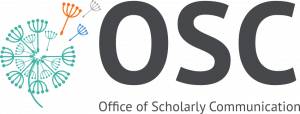 We also launched our new logo in 2017 – with the dandelion motif – to symbolize dissemination. As one of our team mentioned, they are a weed, but they are also very effective at spreading themselves around. We are not sure what that says about us.
We also launched our new logo in 2017 – with the dandelion motif – to symbolize dissemination. As one of our team mentioned, they are a weed, but they are also very effective at spreading themselves around. We are not sure what that says about us.
Review of the Office of Scholarly Communication
After two years of operation, the Office of Scholarly Communication was the subject of a Review by the University. The actual Review took place in mid July, after a lead in requiring considerable work to reflect and summarise the work that has been done in this initial stage of the Office.
The process did represent a significant amount of extra work for the team in document preparation, and there is no denying this was a very stressful period. But it was extremely edifying to have such a high level endorsement of the approach the OSC has taken, with the Panel commending the team “for a highly creative and professional approach to setting up the service, and for achieving rapid growth in awareness, engagement and compliance in open access throughout the University”.
The Panel noted they had received “very positive feedback from service users who had responded to the consultation, and from external stakeholders”.
The Panel also commented on a “pro-active stance towards external engagement and advocacy for scholarly communication, being recognised as an internationally renowned and pioneering leader in the field of scholarly communication”. The blogs here on Unlocking Research are an example of this work.
Generally the OSC staff have continued to contribute to professional activities within and outside the University to help develop robust policies and services in the area of scholarly communication.
The first recommendation of the Review of the OSC was that a Working Party should be convened to “clarify the University’s needs and expectations in relation to Open Research”. This will be an important piece of work for the OSC with the University throughout 2018.
Staff changes
In April 2017 the Cambridge Library community welcomed Dr Jess Gardner as the University Librarian. In October last year Professor Stephen Toope was admitted to the office of Vice Chancellor at Cambridge University. These are significant leadership changes for the Library and the University.
Locally, scholarly communications was further embedded in the fabric of core business for the Library with the creation of a new Directorate in Scholarly Communication and Research Services, which Dr Danny Kingsley is heading in her new role as one of the Deputy Directors of the Library. Drs Lauren Cadwallader and Arthur Smith moved into Acting Deputy Head roles for the OSC.
The OSC said farewell to two members of the Research Data Management Facility. In April Rosie Higman moved to a new role at Manchester University and in July, Dr Marta Teperek moved to a role at Delft University in the Netherlands. This has been a big loss for the OSC team, although we maintain a strong working relationship with them both and have now been able to extend our collaborations across institutional and country lines.
On the other side of the ledger, we welcomed several new people to the team. In January, Dr Andre Sartori joined the Open Access Team. In May, Dr Marta Busse started work as our Research Data Coordinator. Dr Melodie Garnier joined the team in a Scholarly Communication Support role. We have had Tony Malone working with us, undertaking a wide range of support across our activities. Most recently, Zoe Walker-Fagg has joined as our Project Manager and lead on the thesis work.
There were some internal changes from within the Cambridge library community as well. Dr Matthias Ammon moved to a new role in a departmental library. Katie Hughes and Lucy Welch joined the team on secondments from other areas of the library network to cover some of the internal movement resulting from those staff who had left. For a team of 17 people, this movement within one year (four out, seven in) has been substantial.
We continue to need to consolidate the contractual and funding arrangements for the staffing of the OSC, and while the situation is considerably more stable than it was at the beginning of 2017, there is still some significant work to be done.
Looking ahead
There are some large projects underway in 2018. We are consulting with our research community and continuing to refine the thesis requirement policy. We are working with Cambridge Digital Humanities and Cambridge University Press on a Text and Data Mining “Test Kitchen” to explore techniques, corpus and copyright issues. We are also looking to understand better how our research community interacts with the published literature.
On the technical side, one of our biggest challenges this year will be to automate our Request a Copy service and start promoting this more actively. We have some interesting plans for engagement including a competition for researchers to have their work explained by a professional storyteller for the Cambridge Science Festival.
The outcome of the University’s work on a position statement on Open Research will affect the direction of the OSC into the future. Regardless, we will continue to support and innovate in the area of scholarly communication with our local community while contributing to the discussions and activities nationally and globally. Plus ça change, plus c’est la même chose sums it up nicely.

